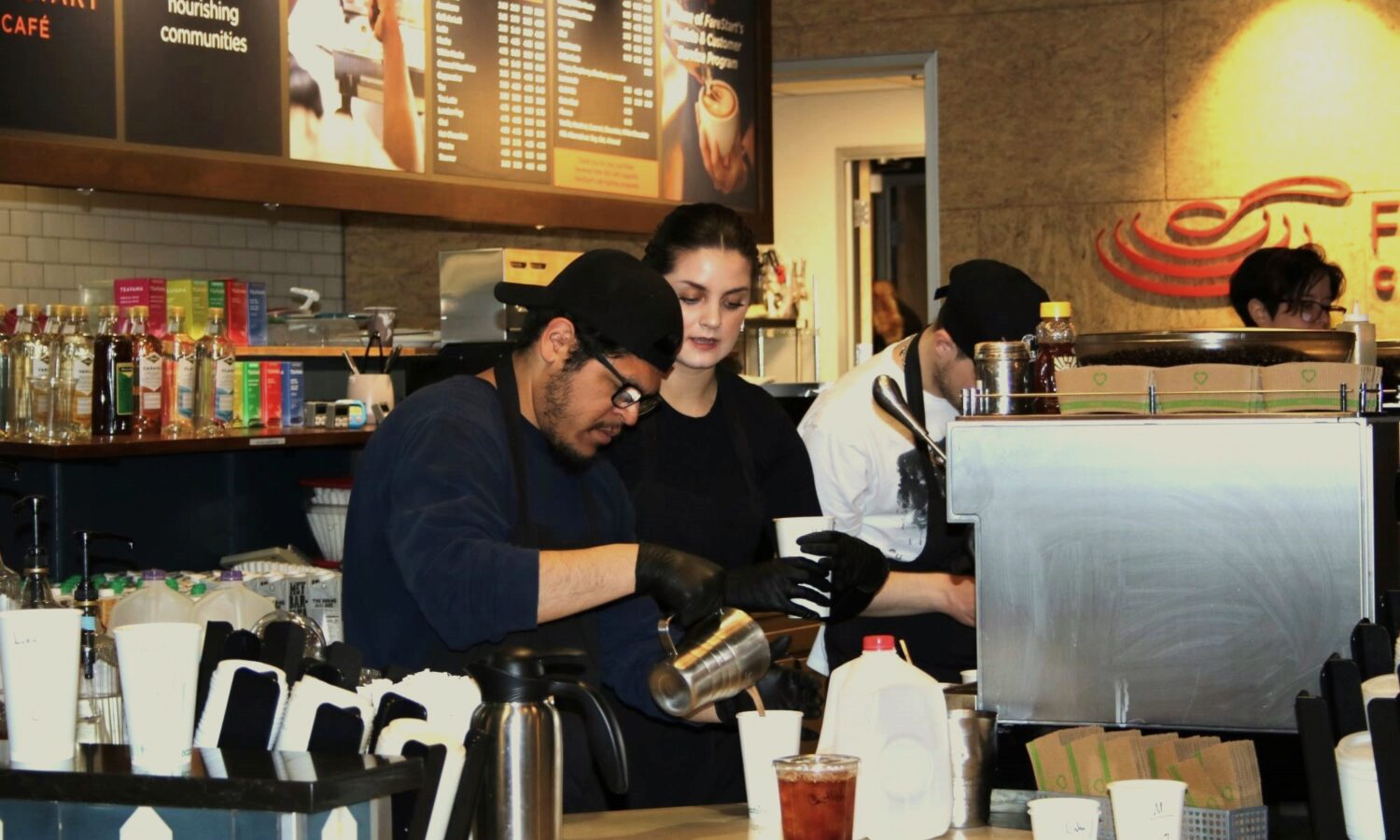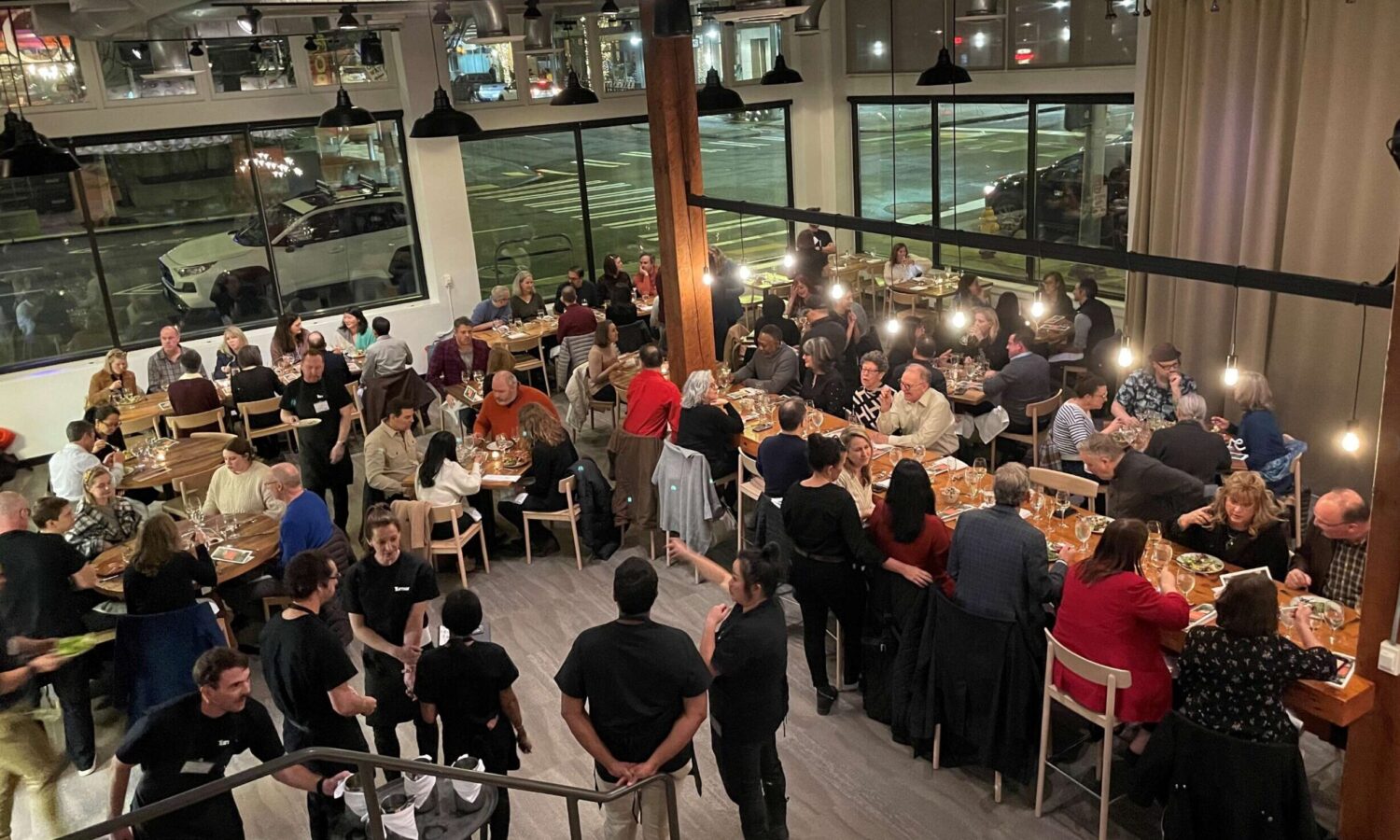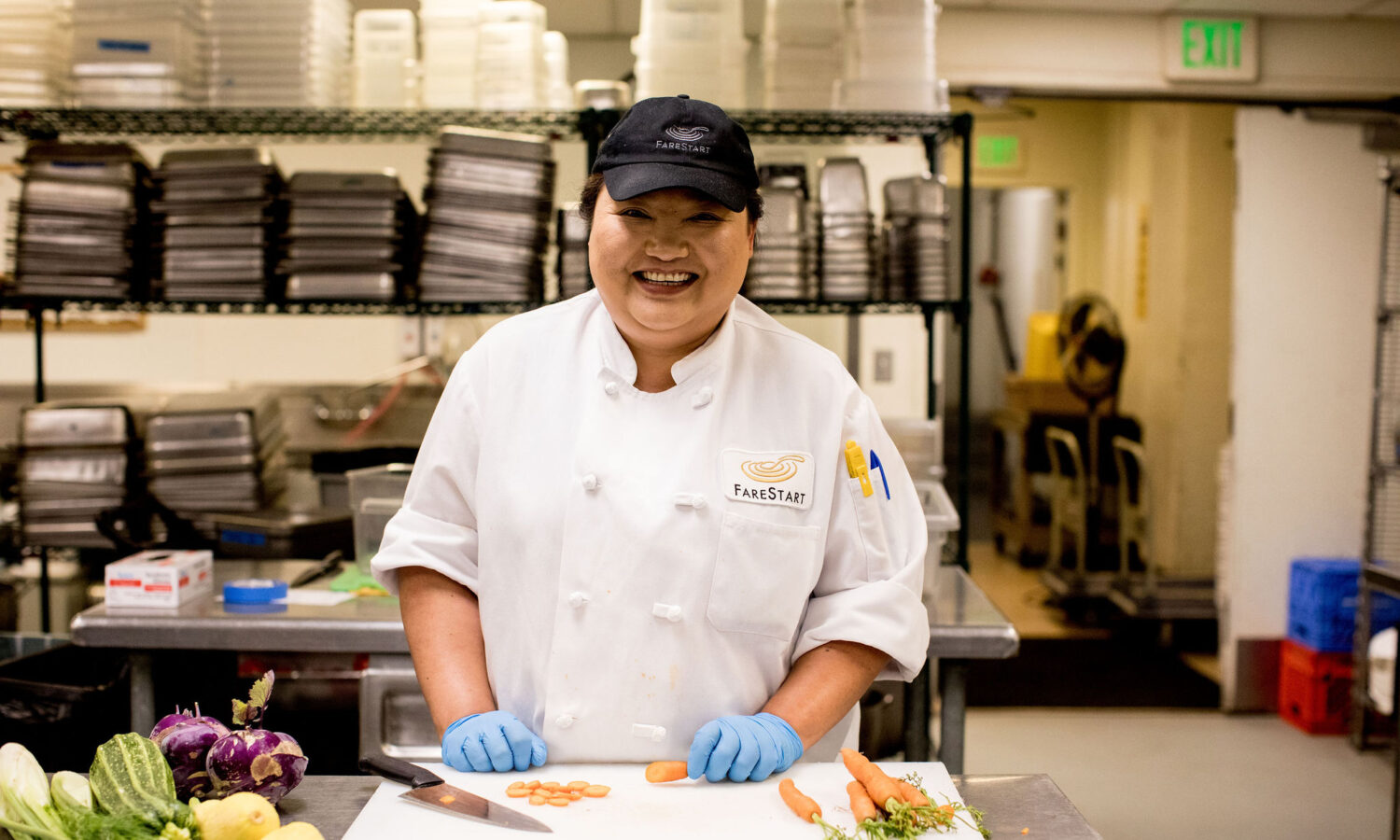 Dozens of people lined up in the parking lot of Health Point Clinic in Des Moines one late April afternoon, stocking up on farm-fresh produce and other healthy staples at FareStart’s Mobile Community Market.
Dozens of people lined up in the parking lot of Health Point Clinic in Des Moines one late April afternoon, stocking up on farm-fresh produce and other healthy staples at FareStart’s Mobile Community Market.
One by one, shoppers filed past the FareStart truck set up like a farm stand, filling their grocery bags with high-quality fruits and veggies. Everything at the market is recovered, donated or purchased from local farms, grocers, retail stores and other partners who share our commitment to making high-quality, locally-grown food more accessible to communities with limited access to healthy and nutritious food.
 “It’s very nice. I’m very happy. This helps me and my family,” said one shopper named Olesia, smiling as she checked out with a bag full of mushrooms, potatoes, carrots, onions and other ingredients she’ll use to make cream of mushroom soup.
“It’s very nice. I’m very happy. This helps me and my family,” said one shopper named Olesia, smiling as she checked out with a bag full of mushrooms, potatoes, carrots, onions and other ingredients she’ll use to make cream of mushroom soup.
Originally from Kurdistan, Olesia cares for her elderly parents and learned about the market during a doctor’s appointment at HealthPoint in partnership with Coordinated Care, one of four South King County partners that host our Mobile Community Markets one afternoon each week from April to October.
Other market locations include the International Rescue Committee (IRC) in SeaTac, Kent YMCA and Virginia Mason Franciscan Health’s Burien Medical Clinic. Plans are in the works to add another site in South Seattle this market season, as well as hosting pop-ups at community events like the one held at Green River College last year.
We work closely with our host-site partners, who know their communities well and help ensure that we understand and meet our customers’ specific needs and cultural preferences, from amaranth greens (grown in India, Southeast Asia, and Mexico), specific varieties of African corn, and bok choy, a staple in Chinese cuisine.
Oxbow Farm & Conservation Center, 21 Acres, Carnation Farms, Sound Sustainable Farms and tBUG (the Bellevue Urban Garden) host groups of FareStart volunteers who “glean” surplus crops that might otherwise go to waste. We also purchase produce from IRC’s New Roots, Aash Farms and Ecolibrium Farms. Grant funding from Harvest Against Hunger covers the cost of much of the produce we purchase from local farms.
Sustainability through Social Enterprise
FareStart’s Mobile Community Market launched as a pilot project in 2021, amid an influx of private and government funding for emergency food programs serving a growing number of people experiencing food insecurity during the pandemic.
“There were lots of safety-net options for folks experiencing food insecurity over the last few years, and what we’ve seen is many of those are going away,” says Emily Penna, Senior Manager of Food Security Initiatives at FareStart.
“To bolster the market’s longer-term viability,” Emily continues, “we needed to figure out how we could sustainably integrate it into FareStart’s social-enterprise model while still meeting the food-security needs of the community.”
 The solution: a payment system that will generate revenue to cover more of the market’s operational and food costs.
The solution: a payment system that will generate revenue to cover more of the market’s operational and food costs.
For the first three years, all food at the market was free. Going forward, shoppers will still have access to free food by using vouchers, distributed through partnerships with organizations embedded in the communities we serve. Vouchers will help FareStart reach people who might earn too much to qualify for SNAP benefits, but not enough to feed their families without running out of money before their next paycheck.
 “This allows us to reach a population that is historically challenging to serve,” Emily notes. “Not because they’re undeserving, but because the funding doesn’t allow for it … or maybe because of the stigma, they don’t want to. Paying with a voucher is like paying with a gift card,” she adds, “so there’s not the same stigma.”
“This allows us to reach a population that is historically challenging to serve,” Emily notes. “Not because they’re undeserving, but because the funding doesn’t allow for it … or maybe because of the stigma, they don’t want to. Paying with a voucher is like paying with a gift card,” she adds, “so there’s not the same stigma.”
The market also accepts Washington Food Assistance Program (WFAP) benefits, credit/debit and FareStart gift cards. Customers who receive food assistance through the Supplemental Nutrition Assistance Program (SNAP) will soon be able to pay for their produce with their SNAP Electronic Benefit Transfer (EBT) cards.
The Mobile Community Market also provides job training for FareStart students. Participants in our Food Pathways Program help prep and package produce in our kitchens, which is eventually distributed via the market.
We’re grateful for the support of several donors that have stepped up to support our Mobile Community Market, including the Clark R Smith Family Foundation, Coordinated Care, New Roots – IRC Farm Program, Linden Rhoads and the Washington State Department of Agriculture.
“Coordinated Care believes access to healthy food is foundational to overall health and wellness, so supporting initiatives addressing food insecurity is a top priority for us,” says Beth Johnson, President and CEO of Coordinated Care. “We are pleased to partner with FareStart to expand their Mobile Community Market program this year and appreciate their unique approach of making food, including culturally-relevant food, more accessible in areas that are traditionally underserved.”
FareStart has held more than 300 mobile markets since 2021, distributing more than 300,000 pounds of produce in South King County, where a growing number of people living on low incomes have moved in recent years as housing costs skyrocket in Seattle. In 2024, we expect to sell and distribute nearly 100,000 pounds of food to 7,000 households.
Learn more about the Mobile Community Market and upcoming market events here.


